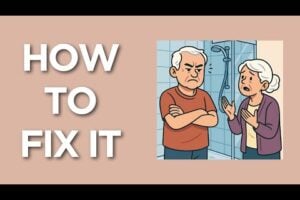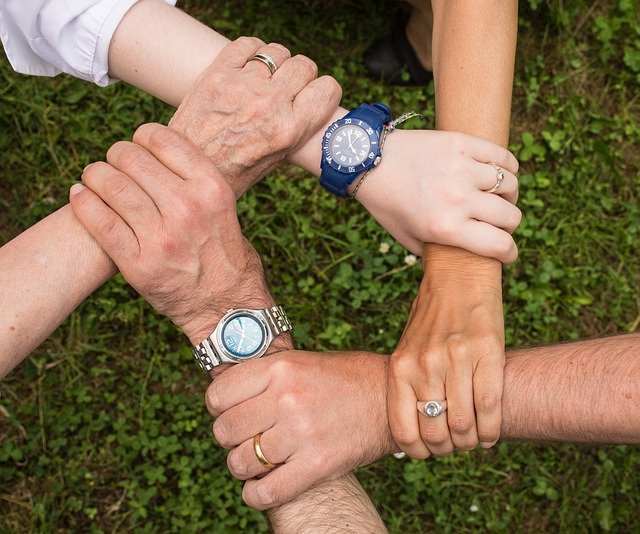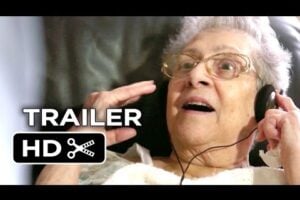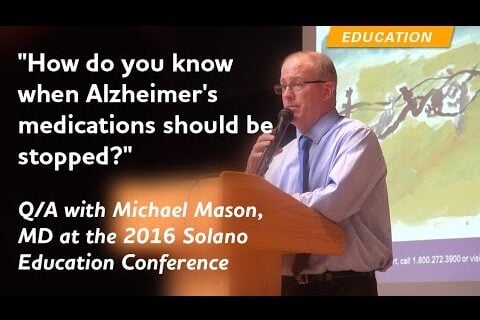TRANSCRIPT OF VIDEO
Dr. Peter Rabins, MD, MPH, Johns Hopkins Hospital:
Caregiving for people with chronic diseases is challenging no matter what the illness. One of the unique aspects of caring for someone with Alzheimer’s disease is that caregivers almost always feel guilty in some way. (Continued below video…)
I’ve come to believe that it is actually the disease itself, Alzheimer’s disease, and the kind of care that people need, that engenders or causes that guilt in caregivers.
Caregiver: You have to realize that it is OK to get annoyed, because they forget.
Caregiver: Some days, I want to cry. I remember the day I sat down with him, took his hand and I said, “Honey. I’m not doing a very good job. You don’t know what I want and I am getting cross. Now what we have to do is ask God to help us.”
1) Recognize You Are Doing the Best You Can
Dr. Rabins: Almost every caregiver becomes frustrated or angry at some point in caring for someone with Alzheimer’s. I think that is one of the causes of the high rate of guilt. Because this is almost universal, I think it’s important to keep in mind that most of the time, the caregiver is doing a good job.
Caregiver: I was probably more harsh than I should have been initially because I really did not believe this could be happening. So when she would make mistakes or be forgetful, I would think that maybe it was a little bit of an attention-getting thing. So when she would do that, I would be pretty severe. “Mom, you know, come on, let’s do it this way.” Or, “Mom, what’s wrong with you.” And I feel really bad about those things now.
Caregiver: I would set in my living room. I would look at the front door and think, “I would like to go out that door and never come back.”
2) Understand that Changes in Behavior are Part of the Disease
Dr. Rabins: Understanding that it is the disease that’s changing the person, that they’re not doing things on purpose, and that your frustration and anger is often in response to these changes that the disease is producing, can help people understand and put in perspective the fact that they get angry and therefore feel guilty.
Caregiver: I kept expecting more of him, forgetting that he really couldn’t do any better. Sometimes it really upset me when I was making such demands on him. Then I thought that this is cruel, he doesn’t know any better.
Dr. Rabins: It took a good while for you to understand?
Caregiver: It took a long while and I look back and am ashamed of my actions.
3) Develop Realistic Expectations
Dr. Rabins: One way to avoid becoming so frustrated and feeling guilty is to have realistic expectations. Understand that the disease is changing the person. If you can, adapt to how they’re changing, and the fact that they can no longer do things that they did yesterday or last month. This can help lessen the likelihood that you’ll be frustrated, and then lower the likelihood that you’ll become guilty or down on yourself.
4) Modify Expectations as the Disease Progresses
Dr. Rabins: Do you think something could have been done years ago in the past would have made
this an easier adaptation?
Caregiver: I guess the area about forcing her to do things that she couldn’t and that anxiety. I think if I had really listened more in and had talked to more people that had explained to me that this is the progression, this is what you can expect, that it would have been easier for me to be kinder, sooner.
5) Accept New Behaviors and the Loss of Social Skills
Dr. Rabins: One of the hardest things to adapt to is that the disease often takes away a person’s social graces. People do things that they never would have done before. That’s hard to see.
Caregiver: We went out to dinner recently. She picked up the meat with her fingers. My immediate reaction was to look around, like, “Oh my goodness! I can’t believe my mother’s doing this!” Because, looking at her, you could not tell that she has Alzheimer’s. Then I thought, “How ridiculous!” You
know, here I am worried about what people are thinking. I should be worried about my mother, but
truthfully my initial reaction was, “What will people think?” The first time something happens, if you
act in a way that you’re not proud of, you should be able to forgive yourself and say, “Okay, you know it’s alright. Maybe I wasn’t the way I should have been, but the next time, I will be ready for this.”
6) Remember: Caregiving is About Love
Dr. Rabins: I think it helps put caregiving in the right context, to help us realize that part of our doing it is coming out the love and caring that we have for the old person. If we can put aside some the frustration guilt and anger, and the love is still there, that the reward of caregiving them can come to the forefront.
Caregiver: I think we just kept trying to stress that it wasn’t her fault and we loved her and we were going to work with her.
Dr. Rabins: Does she respond to hugs and touching?
Caregiver: Oh, yes! And I think they’re important to do so that she did doesn’t feel that she’s not loved. I think it’s very important that she constantly feels this love surrounding her.












Very difficult time for loved ones and patient. There is so much to deal with. Thank u for writing these words.
As I wrote about my grandma, I realized how common it is for us to feel guilty and that we should do more. In reality, there isn't much more we can do, we are going our best.
The advice above is really helpful.
Oh my goodness. You are not alone but like me you feel totally alone..
My husband has frontotemporal dementia, now more than 4 years..it is the longest journey known..I feel alone too because I am..Our relatives and so-called friends stay away in droves!
I don't have any answers. I just live hour by hour.
god help us all.
A
I know exactly what you are talking about. I am the sole caregiver of my husband and have been so for several years. We also no longer see or hear from friends. Except for our son, who lives out of town, and a gentleman from our church that comes once a week we might as well be living on an island. People are afraid that this will happen to them and they do not want to have any connection with it. This is a very lonely time not only for me but for my husband.
Annabellaaust, Please check with your State Senior Service Program for Caregiver Respite Care. It is a Lifesaver for me! Hope this helps you and others who need help caring for your loved one.
At 54 I can say that this is the hardest thing I've ever, ever had to deal with. I can't get any answers from any neurologists or doctors and it's been 9 months of waiting and they still won't try any medication on my mother. My dad just passed away and I must have been in denial for years. Now that my mom lives with me my whole life is at a complete standstill. I've been going through cancer for 3 years now and my own health is at stake because of the massive depression and anxiety that being a caregiver of a severe Dementia case can cause. I try so hard to understand this disease, but I always feel so lonely and helpless at this stage. I feel as though I'm walking on egg-shells every living moment. It has to be the lonliest place in the world to be. Unless you have been where we are you cannot possibly understand the complexity of this disease. I'm always worried what is coming next. Every minute of every day and night is precarious. The not knowing is the scariest part. Thanks for allowing me the space to express some of my feelings.
Jimmy, You are not alone. I feel your pain, as I am Caregiver for my disabled Mother of 82. She has numerous health conditions, but the one that I deal with most is the Dementia/Memory Loss. I have moved in with Mom to take care of her, and it can be a drain on the mind to deal with answering the same questions, day in and day out, cleaning up the messes when she doesn't make it to the bathroom in time, and feeding her meals that are balanced, easy to digest and chew, as she has only two molars that meet, due to lots of years of poor dental care by dentists. I found out that our state (FL) has a Senior Services Program to provide Respite Care for the Caregiver, so that I can have time to go shopping, eat out with family, or just relax without feeling guilty leaving Mom alone. The CNA is WONDERFUL to MOM and me. She spoils us both and has become a trusted friend and confidant in just a month's time. If it weren't for finding out about this program, I fear that my Frustrations with Mom would get the best of me, and in turn would become anger towards MOM. I thank GOD for showing me this program. This program is funded by the State, and Elderly folks who cannot complete all 7 Activities of Daily Living without Assistance are eligible. There may be a waiting list, but it's worth getting on the list NOW! I recommend it highly as it has given me back some of my life and allowed me some time to myself. GOD BLESS ALL CAREGIVERS and GIVE THEM STRENGTH TO ENDURE! Your Spirit will be Lifted and a Burden Lightened once you have a Respite Caregiver to Assist you. STAY STRONG!
For 8 years I have been my wife's Primary Caregiver, and for at least 5 years I have been a giant fan of Teepa Snow. While my wife survived S.C. Lung Cancer, 3 strokes due to a congenital heart defect, heart surgery to correct the defect, 3 vascular strokes due to IntraCranial Atherosclerosis, Acute Hydra-Cephalus and emergency brain surgery to lower her 155 Cranial Pressure, a total of NLT 14 TIA's, and most recently a 7th stroke 4 months ago – I have learned more & more about my wife's Vascular Dementia from 3 of Teepa's videos . . . "Stay calm (no matter what she does), never argue (no matter what she says), never react to her adamant and repeated outbursts by raising your voice (no matter how many times she repeats or how loudly she shouts), and always (change the subject), always (apologize for not understanding), always (smile and say . . . "I love you!"), and always re-inforce your love by enjoying every moment we spend together. Uncle Don
My husband has been diagnosed and it is in the early stages but still noticeable even by friends. He is 79. He is in the angry stage cause he knows it's happening but is in denial.
Exactly the same as my
dad…
My daughter sent me this link as we care for her step-dad. We are just beginning our journey but this is helpful. Dr. Rabins' book was highly recommended by a colleague & after viewing this I will certainly invest in it.